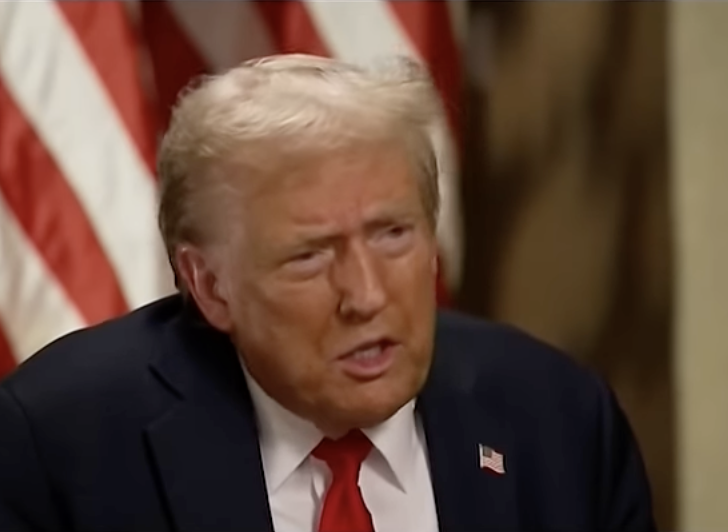Breaking News
Trump Says He Will Unleash Military Against Americans Who Are the ‘Enemy from Within’

Source: YouTube
In a recent interview on Fox News, former President and current Republican candidate Donald Trump stirred controversy with a statement suggesting he would use the National Guard or even the U.S. military to combat “the enemy from within” on Election Day if necessary. This provocative term has raised questions about what, exactly, Trump means by “the enemy from within” and has prompted reactions from political figures across the aisle. Here, we’ll explore Trump’s statements, define the term in the context of his remarks, and highlight responses from Democratic Vice Presidential candidate Tim Walz, presidential candidate Kamala Harris, and Trump’s running mate, JD Vance.
Defining “The Enemy From Within” in Trump’s Context
In his interview with Fox News, Trump characterized “the enemy within” as Americans he sees as threats to the nation’s stability and prosperity. He described these individuals as “radical left lunatics” and specifically mentioned California Representative Adam Schiff, a prominent Democrat. For Trump, “the enemy from within” appears to refer to Americans who, in his view, disrupt or challenge his policies, ideology, or authority. This phrase paints his political opponents as not just adversaries but internal threats, seemingly justifying the potential use of military force against them.
Trump’s words signal a stance that echoes some of his earlier controversial actions. Throughout his presidency, he often threatened to deploy the military to control domestic unrest, particularly during protests and riots. His statements today have amplified those threats, raising concerns about his willingness to apply military power to civilian conflicts if re-elected.
Kamala Harris’s Condemnation
Democratic presidential candidate Kamala Harris has been vocal in condemning Trump’s recent “enemy from within” comments. In a speech in Pennsylvania, she warned that Trump’s rhetoric could seriously threaten American freedoms. Harris argued that Trump’s statements suggest he views any opposition to himself as an “enemy of the country.” She said that Trump’s actions would likely target journalists, judges, and election officials who refuse to bend to his will, branding these Americans as adversaries simply for performing their duties with integrity.
Harris’s campaign has even released an ad titled “Enemy Within,” emphasizing the potential risks of a second Trump presidency. The ad highlights that Trump’s intentions could be aimed at unchecked power and frames his candidacy as a danger to democratic freedoms. Harris underscored this point in her remarks, stating that Trump’s readiness to use military force against U.S. citizens reflects a threat to civil liberties that should alarm every American.
Tim Walz’s Reaction on “Enemy from Within” Speech: “Sick to My Stomach”
Minnesota Governor Tim Walz, Harris’s running mate, echoed her concerns, labeling Trump’s comments as “treasonous.” Speaking at a rally in Wisconsin, Walz, a former member of the military, expressed his disgust at the prospect of using U.S. military forces against Americans. He pointed out that Trump’s words undermine the foundational values of freedom and unity that the military exists to protect. Walz went further, suggesting Trump’s willingness to deploy military power on his political opponents paints him as “a fascist to his core.”
Walz’s statements reflect a deep-seated concern among Democrats that Trump’s comments signal a dangerous shift towards authoritarianism. He noted that Trump’s comments are unprecedented in modern American history and that his campaign would continue to challenge the normalization of such rhetoric.
JD Vance Defends Trump’s Remarks
On the Republican side, Trump’s running mate, Senator JD Vance, offered a different perspective. Vance argued that Trump’s comments should be interpreted as a legitimate reaction to the violence and unrest he associates with left-wing activists. According to Vance, “the enemy from within” could also be understood as individuals who engage in destructive protests or individuals who entered the country under the Biden administration’s policies and may pose security risks.
Vance reframed Trump’s remarks as addressing concerns over immigration and domestic safety, particularly following the Afghanistan withdrawal. He suggested that some threats by “enemies from within” are attributable to Biden and Harris’s immigration policies, which Vance claims allow dangerous individuals to enter the country unchecked. This interpretation positions Trump’s comments as aligned with concerns about law and order, framing them as a response to perceived inadequacies in current border policies.
Public and Political Implications
Trump’s “the enemy from within” statement has sparked intense debate about the role of the military in civilian affairs and the extent to which a president can or should use such language. Harris and Walz, along with other Democrats, argue that Trump’s words reveal a dangerous disregard for democratic norms and suggest a desire to suppress dissent through force. Their concerns reflect fears that a second Trump term could lead to a weakening of civil liberties and an erosion of democratic checks and balances.
On the other hand, Trump and his supporters, like Vance, view the “enemy from within” language as a necessary response to what they see as internal threats to the country. For them, the term underscores a commitment to law and order, with the suggestion that, if needed, the National Guard or military could play a role in maintaining peace on Election Day.
Trump’s statements, and the responses from his opponents, highlight a deeply polarized political landscape. With Election Day approaching, the conversation around “the enemy within” will likely continue to fuel debates about democracy, freedom, and the role of government in enforcing security.
